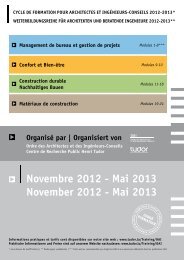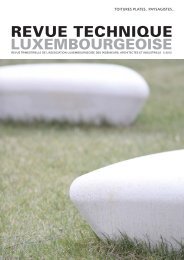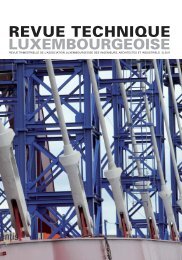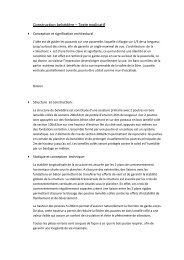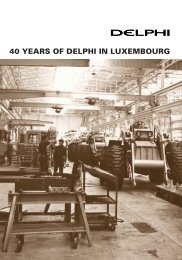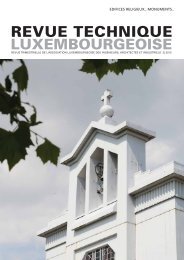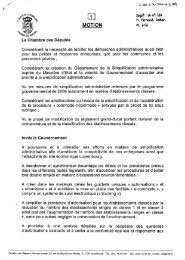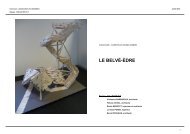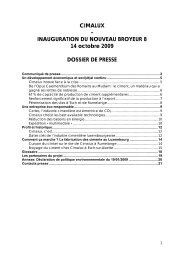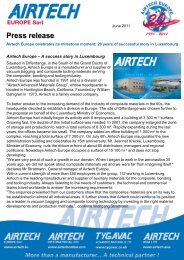Revue Technique Luxembourgeoise
Revue Technique Luxembourgeoise
Revue Technique Luxembourgeoise
You also want an ePaper? Increase the reach of your titles
YUMPU automatically turns print PDFs into web optimized ePapers that Google loves.
42 PARTENAIRES | REVUE TECHNIQUE LUXEMBOURGEOISE 3 | 2011<br />
Boson Energy SA is a prime example of technology transfer in action: award-winning work in research, development<br />
and innovation about to be released on the European market. The product: the Boson Energy Unit, a small-scale plant<br />
that uses gasification to convert wood and other cellulose-based biomass into gas and ultimately into green electricity<br />
and heat. Clients include: industries, communities, hospitals and others. Although the concept itself is certainly not<br />
new, the technology involved, High Temperature Agent Gasification (HTAG), is cutting-edge. Jan Grimbrandt, Chairman<br />
of the Board, and Friedrich Heggemeier, CEO of Boson Energy SA, are busy setting up the first commercial-sized<br />
demonstration plant based on the Boson Energy technology, located in Luxembourg.<br />
Boson Energy SA<br />
ADVANCED TECHNOLOGY FOR GREEN ENERGY_<br />
Liza Glesener<br />
Boson Energy SA<br />
Managers<br />
Jan Grimbrandt (Chairman<br />
of the Board),<br />
Friedrich Heggemeier (CEO)<br />
Date of creation<br />
2008<br />
Location<br />
Headquarters in Luxembourg,<br />
with a subsidiary in<br />
Gothenburg, Sweden<br />
Employees 6<br />
Line of business<br />
Renewable energy<br />
Main activity<br />
Supplying and remotely<br />
operating small-scale<br />
combined heat and power<br />
production units utilising<br />
cellulose-based local<br />
biomass; with the capacity<br />
to deliver 1-3 MW electric<br />
and 1.7-5.1 MW thermal,<br />
making the units ideal for<br />
clients with a base load<br />
between 15 and 50GW per<br />
year<br />
From fundamental research to a commercially viable<br />
product<br />
“Professor Blasiak from the Royal Institute of Technology<br />
in Sweden started looking into the process of HTAG over<br />
ten years ago,” says Grimbrandt about his co-founder of<br />
Boson Energy SA. The fundamental research conducted at<br />
the university was followed by more practical engineering<br />
and design work to produce a commercially viable product;<br />
two patents have been filed, more are to come. The core of<br />
the technology is a two-step gasification process. Biomass<br />
is preheated before being fed into the gasifier, resulting in<br />
high quality gas with almost no tar content thereby making<br />
the costly process of gas purification obsolete - a major improvement<br />
on the conventional method. “A normal gasifier<br />
without the HTAG technology produces anything between<br />
7-10.000mg of tar per m3 gas,” Grimbrandt explains. “But<br />
in order to run an engine effectively, a tar content of under<br />
5mg is needed.”<br />
The Boson Energy Unit has further advantages: it is relatively<br />
small and perfectly suited for a decentralised grid,<br />
thus following the European trend for a more evenly distributed<br />
power system. Moreover, unlike other renewable<br />
energies, the use of biomass allows the continuous production<br />
of energy, 24/7. And, contrary to most people’s beliefs,<br />
“operating a Boson Energy Unit will save you money. Going<br />
green is cheaper!” Grimbrandt is adamant. Renewable incentive<br />
schemes mean that the electricity produced generates<br />
income for plant operators, while the produced heat<br />
can either be fed into the operator’s own system, creating<br />
savings, or be distributed locally, yielding further income.<br />
Wood – a fuel of the past, a fuel of the future<br />
“Our preferred biomass is wood; that is what we focus on<br />
now and in the medium to long term,” states Heggemeier.<br />
This means wood chippings and other waste wood,<br />
but also agricultural crops such as Miscanthus, a highly<br />
cellulose-based grass, can all be used in the plant. Pellets<br />
work well too, but are not ideal - not because of their<br />
energy value, but because of Boson’s green policy: pellets<br />
are pre-processed and often shipped halfway around<br />
the world, before reaching their final destination. “That<br />
would give you a fossil footprint on a green product,”<br />
says Grimbrandt. “We’re very much into not only renewability,<br />
but also sustainability. Biomass should come from<br />
local producers and be prepared for gasification directly<br />
on site.”<br />
Working together for better technology<br />
HTAG is not the end of Boson Energy’s innovation schemes:<br />
several projects are on the go. One example is AGaTe, investigating<br />
alternative biomass fuels in collaboration with<br />
KIC InnoEnergy and the Karlsruhe Institute of Technology.<br />
More locally, Boson Energy is setting up a partnership<br />
with the CRP Henri Tudor, while the company is also<br />
a member of the Luxembourg EcoInnovation Cluster, a<br />
network, animated by Luxinnovation, that regroups a variety<br />
of businesses and research organisations involved in<br />
the eco-technologies sector, with the aim to create new<br />
“green” business opportunities through collaborative research,<br />
development and innovation. “We see this participation<br />
very positive for the future,” says Grimbrandt.<br />
Heggemeier agrees: “The EcoInnovation Cluster is giving<br />
us a lot of opportunities to see how we can make a cause<br />
for our technology, but also co-operate with other small<br />
to medium-sized companies like ours.”<br />
Boson Energy SA is more than happy to have chosen Luxembourg<br />
as headquarters. “The Ministry of the Economy<br />
and Foreign Trade and Luxinnovation have been fantastic in<br />
supporting us to get in contact with other companies. Boson<br />
Energy now has the complete capability to execute the<br />
demonstration project and has the right partners for future<br />
system supply from Luxembourg – once again, keeping it<br />
local and thus, more sustainable.”




